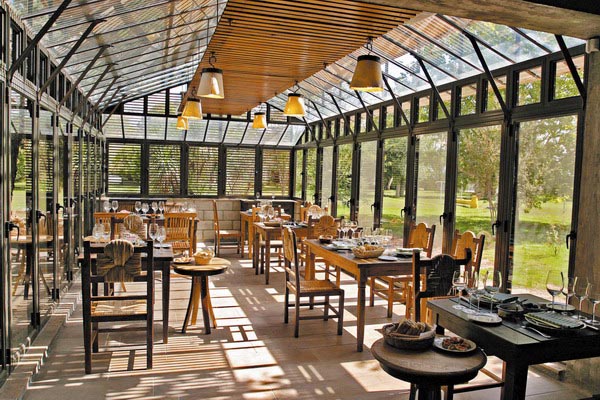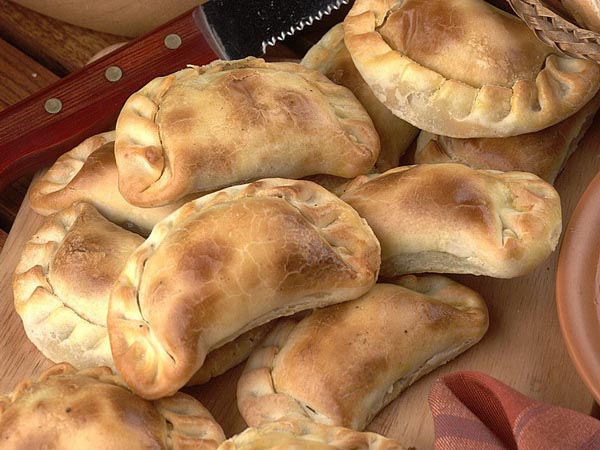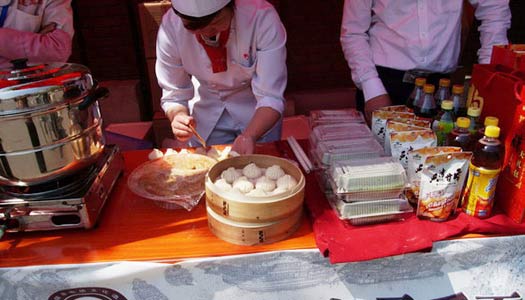
Architecture and food in Argentine wineries
Updated: 2012-09-03 10:05For those Chinese who like to enjoy a glass of wine within four walls, it is sometimes easy to forget the industry is closely connected with nature.
As ties are becoming increasingly closer between China and Argentina, wineries in the South American country are trying to lure Chinese tourists not just with their great wines but also the dazzling scenery, magnificent architectural beauty and delicious food.
|
 Familia Zuccardi winery's restaurant in Mendoza. In March the restaurant hosted a wedding reception for a couple from China. The restaurant plans to put on a Chinese-language menu. "We are looking forward to accommodating more and more customers from China," said Julia Zuccardi, manager of the restaurant.??[Photo/China Daily] |
Sheltered by the Andes Mountains and fed by its melt water, wineries in the Mendoza area - the winemaking area in the center of West Argentina that produces 70 percent of the beverage in the South American country - command a breathtaking view of leafy green vineyards growing against a background of snow-capped mountains.
In some cases, the architecture of the winery itself is an essential part of the landscape. Located near the town of Tupungato, a two-hour drive southwest from the downtown area of Mendoza city, the Dutch-owned Salentein winery features an impressive complex.
The magnificent winery is built in the shape of a giant cross, which, besides its architectural beauty, allows gentle handling of the grapes and reduces the distance wine needs to be moved during its production.
Through its glass dome, sunlight during the daytime casts a huge cross upon the center of the underground cellar, surrounded by 5,000 barrels of wine. Together with the solemn and august atmosphere in the tasting room, it lends a touch of sacredness and religiousness to the surroundings.
Attached to the winery there is also a world-class art museum that hosts exhibitions - some permanent and some temporary - throughout the year. The art pieces shown in the museum include contemporary works by both European and local Argentine artists.
Apart from the art museum, the winery also runs a restaurant and an inn that has a beautiful garden and a swimming pool. "More and more Chinese people are coming here during the hiking season every year, although the total number is very small," said Maria Lorena Cepparo, customer relations manager at the winery.
The indigenous culture also has its own share of influence on the wineries. Catena Zapata, the winery owned by Nicolas Catena, a legendary figure in the country's winemaking industry for helping to put Argentine wine on the world map, is a tribute to the ancient native Argentine culture.
The architecture of the winery, which looks like a pyramid, is inspired by the Mayan ruins of ziggurats in Central America, according to Laura Catena, Nicolas' daughter, writing in her wine book Vino Argentino (Argentine Wine).
Restaurants are another highlight in any wine-tasting tours organized by the wineries. The Familia Zuccardi winery, one of the major wine producers and exporters in the country, is located a 30-minute drive east of Mendoza city and runs one of the largest restaurants in the area.
|
 Argentine dim sum served at Familia Zuccardi winery's restaurant in Mendoza. Because the food culture has its own share of influence on the wineries, restaurant food is highlighted in any Chinese travelers' wine-tasting tours organized by wineries in Argentina. [Photo/China Daily] |
"Chinese tourists are very fond of Argentine food," said Julia Zuccardi, manager of the restaurant, who is also the daughter of the Familia Zuccardi winery's owner.
In March, the restaurant hosted a wedding for a Chinese couple. It plans to put on a Chinese-language menu. "We are looking forward to accommodating more and more of them," Zuccardi added.
Another famous restaurant in the area is run by the O Fournier winery, 120 kilometers south of Mendoza. Spaniard Jose Manuel Ortega owns the winery and his wife, Nadia Haron, well known for her innovative dishes, is the chef.
Former banker Ortega, 44, took great pride in the fact that the restaurant won the award of Best Restaurant in Argentina from the National Academy of Gastronomy. It is very rare for a winery's restaurant to win such an accolade.
Sitting in the restaurant, built in an elegant glass structure that allows a great view of the Andes' snow-covered peaks, whether drinking coffee or wine, one is bound to get high.
Contact the writer at zhousiyu@chinadaily.com.cn
- BYD exports three electric cars to Thailand
- Grid gets first jolt of residential solar power
- US now largest buyer of China's exports
- China's outbound M&As on the rise
- Tobacco control may entail price, tax rises
- Quanzhou becomes pilot financial reform zone
- New automobiles shine at Geneva Motor Show
- World's longest high-speed rail 'on track'
- Jiugui Liquor involved in plasticizer scandal again
- Accident reignites school bus safety concerns
- China to revise labor law
- Trademark registration under scrutiny
- Dinner ban takes toll on liquor firms
- CIC tables bid for London's Chiswick Park
- Property buyers eye overseas market
- Call for law to protect personal information
- China to cut train ticket prices
- Christmas business
- Solar industry to get jolt from new policies
- KFC chicken under spotlight














